Rob Boffard's Blog, page 2
January 25, 2018
Bright, Starkiller Base, and why movies get things wrong
There’s a great piece over at Polygon about the recent Netflix film Bright – the Will Smith movie about orcs and wizards and elves in modern day Los Angeles which everybody hated the passion of a thousand fiery sons. Well, I say everybody: critics despised it, but judging by the audience scores on sites like Rotten Tomatoes, fans rather liked it, because this 2018 and fuck informed opinions, amirite bro?!?!
Anyway, the Polygon story isn’t about how terrible Bright is. It’s about how ambitious the concept behind it was, and what its creators dreamt for it. Writer Max Landis – he of the fantastic Dirk Gently TV series – tweeted in 2015 that in Bright, he’d written his Star Wars, created a concept that would endure long beyond its original movie. The piece on Polygon dissects that in the wake of the movie’s release, coming to the following conclusions: 1) It’s not, 2) Landis was being a bit silly, and 3) not even Will Smith was going to make it so.
Among other things, the story points out that the way the world of Bright was constructed, with all sorts of magical beings operating inside present-day Los Angeles, and with an entire history of existence on this planet going back thousands upon thousands of years, simply couldn’t happen. Not just in the sense that orcs don’t exist, but that a present-day Los Angeles with a recognisable LAPD and Mexican gangsters and the like simply wouldn’t happen. For one thing, if there really was magic dating back many centuries, then Christianity as we know it wouldn’t have existed. That means that the Catholic Church wouldn’t have had nearly the same amount of power, which means that the Spanish may not have been the ones to conquer Central America (if it was even conquered all) which means no Latinos in America (if America even exists anymore) which means no hardcore Mexican gangbangers. No way Jose.
It’s one of those points that makes you tilt your head and go: “Huh.”
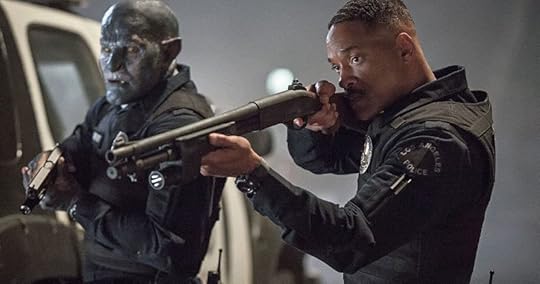
I’ve been thinking about this a lot recently – not just the fact that the movie was trash, which for the record, it very much was. In fact, I’d go further and say it is one of the worst things I’ve ever seen, a movie which managed to be both deeply intense and very, very boring. No, what I’ve been thinking about is the fact that the movie’s lore and backstory just didn’t work, on any level, not even on the Christianity–Catholic Church–Mexican gangster thing I mentioned earlier – and it got made anyway.
That is one of the most enduringly weird things about movies – all movies, in all eras. The back story, wider plot ramifications, worldbuilding and such often don’t make any kind of sense. And this goes for everything, from tiny, low-budget indie films to massive Hollywood blockbusters. Plot holes are left uncovered, gaping questions left unanswered, the laws of physics not just broken but smashed repeatedly into each other.
Think I’m exaggerating? Star Wars: The Force Awakens. They’ve got this second Death Star thing that is so big it has whole forests growing on its surface. It fires its giant killer laser beams by sucking in the energy from a nearby star, wiping it out of space. Which sounds very cool, but begs the rather obvious question: what then? What happens to the forests? The gravity? And what does the Starkiller Base do next? To get it to another star, which it presumably needs to do, you’d need it to travel at the speed of light – can you even do that with an entire planet?
This isn’t nitpicking. These aren’t tiny points. This is something that occurred to me in the cinema, while I was watching the film. It renders the entire concept of the base ridiculous. It was as if the filmmakers got a cool idea – because make no mistake, Starkiller Base is a cool idea – and never actually stopped to interrogate it, ploughing ahead without any thought as to how it might yank fans out of the movie.
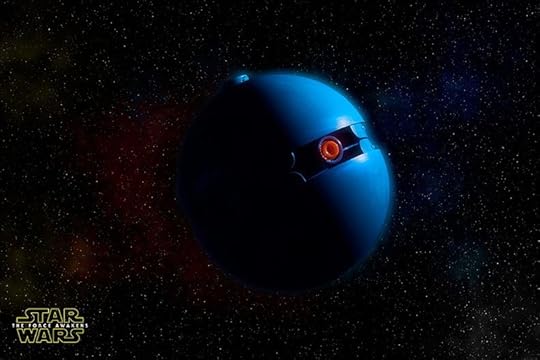
What I’m going to say next is going to come off as a little bit indignant and self-righteous, and I swear that’s not what I’m going for. But here’s the thing: if I tried to pull that shit in any of the books I write, I wouldn’t even get past my initial readers. Every single one of them would just laugh in my face – they do that anyway, because I’m their mate, and we make a game out of giving each other hell, but here, they’d have a good reason. Ditto for just about every other novelist on the planet; even if they, for some reason, didn’t catch an egregious plot error, their editors almost certainly would. The editorial notes I get back from Orbit’s Anna Jackson on the manuscripts I sent her are incisive, clearheaded, and often absolutely brutal, as are those from my agent Ed Wilson. The chances of Anna, or Ed, letting something like Starkiller Base sneak into one of my books are between zero and oh hell no. I’m pretty sure I speak for other writers when I say that their editors are exactly the same.
So what gives? Why are novelists being held to a much higher standard than Hollywood filmmakers? It’s not just because the bigger the budget, more leeway you get, and the less likely you are to be questioned – any first-time director will tell you that interference and notes from studios are ubiquitous. So how come JJ Abrams is allowed to sneak in Starkiller Base, and I’m not?
Part of the reason it happens, I think, is that there are so many more people involved in the movie, and so many more moving parts. With a book, the only real moving parts, in terms of those actually making the decisions about what happens in the finished product, are me and my editor. Yes, I might have to move heaven and earth to make something work, but I only have to consult with one person about it, and don’t have to call in teams of unionised carpenters, set directors and props specialists to make it happen.
That, unfortunately, is the reality of moviemaking. You’re producing a giant thing on a fixed budget, dealing with a zillion different people every single day, and you have to get it all working in some kind of unified order if you’re ever going to come out in the black. As a result, there is not often enough time to pay attention to things like plot holes or world building, because there are so many other elements to deal with. It doesn’t excuse the often ridiculous plot points in movies, but I think this goes some way to explaining why they exist in the first place.
And the thing is, a lot of the time, this is fine. It doesn’t actually ruin the experience, as the millions and millions of people who saw and enjoyed Star Wars: The Force Awakens (and indeed Bright) will tell you. It’s a lot easier to buy into the world of the movie then it is to buy into the world of a book: the first is unfolding in front of you, presenting you with thousands of visual cues to help your imagination, whereas a book demands quite a bit more. I’m not saying that either is better, just that watching a movie or playing a videogame tends to make you a lot more forgiving. And funnily enough, I can illustrate this with another Max Landis product, the aforementioned Dirk Gently series, based on the Douglas Adams books.
The series is absolutely riddled with plotholes, mostly because it makes the mistake of involving time travel (this isn’t a spoiler – it is evident from ten minutes into the first episode). Time travel is the Great No, the big thing that is impossible to do right – not even Looper, a spectacular film in its own right, managed to resolve all the paradoxes. And yet, it was easy to forgive in Dirk Gently, because it was so much fun to watch.
Yes, the things happening on screen were vastly improbable, but the twisty plot, fantastic characters and killer performances meant that it didn’t matter. Nix (wife) and I binged both seasons in about three days straight. So yes, it’s annoying that movies aren’t held to the same standard as books, but they’ve got to be judged a little differently.
What about you? What book/movie plotholes pulled you out of the story? Which ones have you forgiven in the past? Let me know in the comments below.
Image: Starkiller Base by the_jetboy, CC licence

OUTER EARTH: THE COMPLETE TRILOGY
Dropping 6 Feb 2018 – Orbit Books
This new edition of the OUTER EARTH series contains three adrenaline-fuelled novels: Tracer, Zero-G and Impact.
Outer Earth is a huge space station orbiting the ruins of our planet.
Dirty, overcrowded and inescapable, it’s humanity’s last refuge . . . and possibly its final resting place. There are dark forces at work on the station who are seeking to unleash chaos. And if they succeed, there will be nowhere left to run.
‘FAST, EXHILARATING, AND UNFORGETTABLE. ONCE YOU START, YOU CAN’T STOP.’ Sarah Lotz, author of The Three
‘RELENTLESSLY FAST PACE…VIVID ACTION SCENES’ SFX
‘EXHILARATING. GUARANTEED TO KEEP YOU HOOKED TO THE VERY LAST PAGE’ Glamour
PREORDER NOW:
Amazon
Barnes and Noble
Book Depository
IndieBound
Google Play
iBooks
Kobo
Waterstones
Indigo Chapters
(Don’t see your favourite store here? Let me know, and I’ll add it!)
January 18, 2018
The Outer Earth Trilogy Is Here!
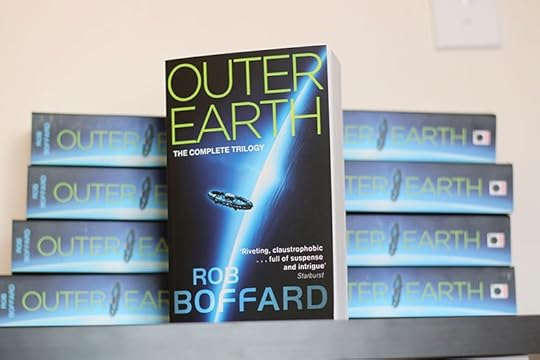
WOAH. What in the shit is that?
That, my pedigree chums, is the collected Outer Earth series in one massive omnibus edition.
Wait…what?
All three books in the series – Tracer, Zero-G, Impact – squashed together in an absolute doorstopper of a book, for the price of a single hardcover novel. Three in one. Three for one. Whatever the hell you want to call it, we did it. Well, Orbit Books did it. I just wrote the things.
On a related note, does anybody else think the word ‘omnibus’ sounds wonderfully old-fashioned? I’m not sure it’s the best way to describe things here. I like to think of this one as a boxset. The Outer Earth Boxset has a real nice ring to it.
But it doesn’t come in a box, tho…
Shut up.
Aren’t the individual novels out already? Why are you rereleasing these books?
Well spotted, Sir and/or Madam. Your perspicacity knows no bounds. Ah, perspicacity…now there’s another wonderful old word…
Sorry. Anyway. The original trilogy sold just fine, but one of the things Orbit and I found was that readers were often unsure of how many books were in the series, or what order they came in. Unfortunately, that’s one of the buggers about book cover design that publishers and authors have to deal with: if you put a number on the cover (as in: “Book 2 of the Outer Earth Trilogy”), and a bookstore is sold out of Book 1, then Book 2 and 3 just get left on the damn shelf.
That, and the fact that Tracer, Zero-G, Impact were marketed as action thrillers. That’s the idea – they are action thrillers – but it also meant that traditional scifi fans didn’t always realise this was a book that they might enjoy too. Again, not something I feel bad about – in publishing, you have to pick an angle, and we did, and it worked out OK. But it does mean that casual readers who don’t know who I am (which, frankly, disgusts me, but there you go) might not have picked up the series.
This is a chance to grab that new audience and shake it very hard thirty or forty times while screaming “READ THIS BOOK” into its face in very loud, spittle-flecked tones. It has a sick new cover, courtesy of designer Helen Surman, and the copy on my desk as I write this looks…well, pretty fucking badass, actually.
What’s it about?
Glad you asked.
A hundred years in the future, we’ve completely destroyed our planet. The last remains of humanity – a million or so people – lie squashed into a city-sized space station orbiting the Earth.
The station is rusting, broken, overcrowded, falling apart. Public transport is long gone. To move packages and messages from place to place, the citizens of Outer Earth rely on tracers: human couriers who can take shipments through dangerous areas. Tracers are smart, fast, agile, and really good in a fight.
Riley Hale is one of them – maybe, if you believe her and her crew, the fastest tracer on the station. She never fails a delivery, never looks to see what her cargo is, and tries her best not to think about the family she lost, years ago. But when she’s ambushed on a routine run, and discovers she’s been transporting a severed eyeball, she finds herself the target of a psychopath who wants to wipe Outer Earth from existence – and humanity with it. To stay alive, she’ll have to run like hell.
Sounds intense!
You have no idea. It’s a flying kick to the head, a story fired out of a shotgun, a nuclear explosion of a novel. Don’t believe me? Here are quotes from reviews of the trilogy…
‘Fast, exhilarating and unforgettable, and once you start it you can’t stop’ Sarah Lotz, author of The Three
‘Sets a new standard for all-action SF’ Ken MacLeod
‘Relentlessly fast pace . . . Vivid action scenes’ SFX
‘Exhilarating and guaranteed to keep you hooked until the very last page’ Glamour
‘If you’re after a fast-paced, action-packed, cinematic space adventure, then [this] is absolutely for you’ Civilian Reader
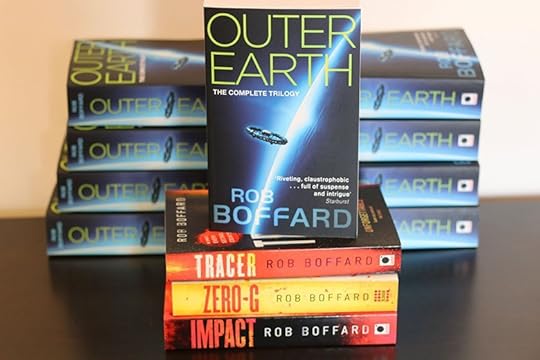
When was all of this first released?
Tracer dropped in 2015. Zero-G and Impact came out back-to-back in 2016.
Three books. OK. So how long is it?
977 pages.
Holy hell!
Yeah.
Wait: couldn’t you just go for an even 1,000?
We could have. But publishers, obviously, don’t want to up their costs too much. And once you go past 1,000 pages, printers start adding on extra zeroes.
And right now, the book is longer than most of the Wheel Of Time novels, by about fifty pages. It also has the distinct advantage of being a complete, finished story that you can read in one go. Also, I didn’t die before I finished it, so there’s that.
Besides: after 977 pages of the kind of action I like to write about, you are going to be more than satisfied. You are going to need a stretch, a stiff drink, a cigarette, maybe while lying in bed with the covers puddled around your –
You know what? I’m overpromising here. Let’s move on.
What about Echoes?
Ah, you’re referring to the collection of short fiction set in the same universe, with four stories focused on four separate supporting characters, set before the events of the first book?
…Yes. Also, why are you talking like that?
God knows. Anyway, no, unfortunately Echoes isn’t in here (977 pages, remember? Echoes is short, but not 23 pages short. It would take things over the 1,000 page limit).
Not to worry! You can still pick up the collection here, for less than a cup of coffee.
When is it out, and how do I get it?
6 Feb 2018. You can order it from your preferred store below! As always, please consider ordering from IndieBound, and supporting your favorite indie store – although it’s available everywhere, and it’s totally cool if you order it from bigger stores too.
Amazon / Barnes and Noble / Book Depository / IndieBound / Google Play / iBooks / Kobo / Waterstones
And if I listen to audiobooks?
You’re in luck! While the omnibus/boxset/space station novel extravaganza isn’t being offered as a single audiobook (which, after all, would stretch to about fifty hours!) you can buy all three novels in audio form on Audible, using the link below.
This sounds awesome. Outstanding. Will you object if I buy several copies as birthday, Christmas and bar mitzvah gifts? Also, I’d like to nominate you for the Man Booker, the Hugo, and the Nobel Peace Prize. Is that cool? I don’t want to intrude…
Yes, fictional interviewer. It’s totally cool. All of it.
November 24, 2017
COVER LAUNCH: Adrift (Out 2018)
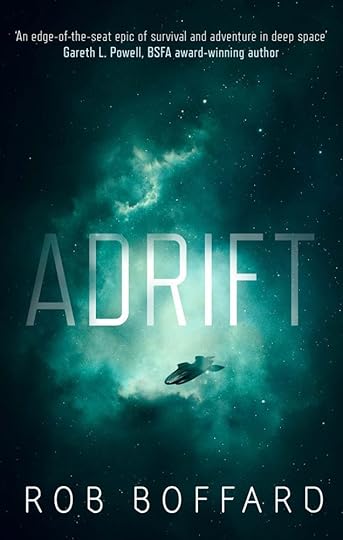
IT IS HERE.
YES IT IS.
AND YOU CAN PREORDER IT AAAAAAAAAH
That’s the cover for my new book ADRIFT. It’s out June 2018. Isn’t it a beauty?
It’s designed by Orbit Books artist Charlotte Stroomer. The book itself – which is about a group of space tourists on the world’s crappiest tour ship who find themselves in one hell of a fucked-up situation – is already getting some great endorsements from across the world of SFF. Here’s a sampling:
‘AN EDGE-OF-THE-SEAT EPIC OF SURVIVAL AND ADVENTURE IN DEEP SPACE’ Gareth L. Powell, the BSFA award-winning author of Embers of War
‘A UNIQUE MIX OF THRILLER, SPACE ADVENTURE AND CONSPIRACY NOVEL – HIGHLY RECOMMENDED’ Jamie Sawyer, author of the Lazarus War novels
‘ADRIFT IS RICH IN DEEP CHARACTER-DRIVEN DRAMA, BUILT ON A HIGHLY SUSPENSEFUL PREMISE‘ D. Nolan Clark, author of Forsaken Skies
Here’s the longer back-of-the-book blurb:
In the far reaches of space, a tour group embarks on what will be the trip of a lifetime – in more ways than one . . .
At Sigma Station, a remote mining facility and luxury hotel in deep space, a group of tourists boards a small vessel to take in the stunning views of the Horsehead Nebula.
But while they’re out there, a mysterious ship with devastating advanced technology attacks the station. Their pilot’s quick thinking means that the tourists escape with their lives – but as the dust settles, they realise they may be the only survivors . . .
Adrift in outer space on a vastly under-equipped ship, they’ve got no experience, no weapons, no contact with civilisation. They are way out of their depth, and if they can’t figure out how to work together, they’re never getting home alive.
Because the ship that destroyed the station is still out there. And it’s looking for them…
I’m not going to say too much about the book now. I am very, very close to finishing the draft of another book (which I can’t actually tell you much about yet – it’s kind of a suspicion of mine not to talk about things before they’re done). That book will be out on Orbit Books in 2019. And next year, I’ll be blogging a lot more than I have this year.
For now, please preorder Adrift (it cooks). Preorders are one of the things that really, really, really help authors. Like off-the-charts help. To say thank you, please enjoy this video of Idris Elba being sexy as fuck.
October 18, 2017
How To Be A Professional Writer

I got to see an old friend for dinner last week, and one of the things we talked about as we stuffed our faces and got drunk was what it meant to be a professional writer.
This wasn’t a philosophical conversation. It wasn’t even a particularly coherent one. It was the kind of conversation that is fuelled by many, many beers, and which keeps going off on tangents where you end up arguing about whether or not Donald Trump has a soul, and if he doesn’t, whether dogshit or dried mosquito corpses take its place. But either way, it stayed on my mind long enough that I wanted to write some of it down here.
One of the things we both agreed on was that being a professional writer didn’t really have anything to do with how much money you made from it (if at all), or whether it was your job. That might have been a good yardstick in the days before self-publishing, but it doesn’t work anymore. It’s very easy to imagine an author, with independent means, devoting most of her time to writing and publishing multiple books – even if she’s yet to make a cent from them, you have to argue very hard to tell me that she hasn’t made that her profession.
After about the tenth beer (and, if memory serves, some damn good tequila) we decided that being a professional writer wasn’t about what you wrote, or what happened to it after it was finished. Someone with sixteen self-published books and close to zero sales could be a professional writer, as easily as someone with a hardback novel at a major house can be a goddamn rank amateur. Here’s how it works.
1. A professional writer shows up.
It sounds simple, but there are plenty of writers who don’t. They are too tired, too lazy, too harassed, too bored or too indecisive to actually sit down and get the work done. If anything, I’d say this is the single most important aspect of being a professional: actually getting the work done.
Professional writers understand, deep in their bones, that not every part of what they are writing is going to thrill and delight them – at least not at first. There will be days where they want to claw their own eyes out, where they’d rather run naked through a giant beehive than put down a single word. But they will do it – the writing, not the beehive thing – even though it drives them nuts. They do it because they know that the feeling of walking away with their heads up, knowing that the work is done, is one of the best feelings in the world.
2. A professional writer works consistently.
You’ll notice that so far I haven’t even mentioned word counts, or page counts. That’s because it actually doesn’t matter one tiny little bit how much you write in a given period. Your target could be two hundred words a week, or five thousands words a day (although if you doing that on the regular, then I’m very sorry for the loss of your fingers). It’s not important. The important thing is that you work consistently, and that you are always working.
Only you know how much you’re capable of doing in a period of time, which depends on so many things, up to and including your mental and physical capabilities, which may mean working is harder for you than it is for other people. That’s OK. But as long as you’re sitting down on your own predetermined schedule, never taking a day off from it, then you, Sir or Ma’am or Other, are a professional, and don’t let anybody tell you different. And no, doing it once a year for NaNoWriMo does not count. NaNoWriMo is a playground for amateurs, and if you seriously think one month of writing a year is going to make you a pro, this post isn’t for you. Come to think of it, life in the real world may not be for you either…
3. A professional writer finishes.
I’m not just talking about the book itself, although God knows, writing groups and fiction sites like Wattpad are filled with scribblers who workshop the same scenes, over and over again, endlessly polishing and tweaking and never actually getting close to the finished article, which is about as useful as a velocipede in a Nascar race.
A professional writer not only understands that there is a need to create a finished first draft, however messy and shitty and filled with plot holes it might be, but that it is essential to keep moving forward. Keep rewriting the same scene, without ever finishing it, and you’re like a version of Bill Murray in Groundhog Day who could leave at any time but decides not to because he’s scared of what happens if he ever gets out of Punxsutawney.
4. A professional writer shuts the fuck up.
I am not interested in how many words you did today. I care not about the trials and tribulations your main character is currently going through. I give less than two tiny mouse shits about the fact that you think your book is too long, too short, or too weird. If you have ever used the hashtag #amwriting on any form of social media, don’t talk to me.
I don’t want to know that you’re writing. I want to read what you’ve written. When you’ve finished? When you’ve got a completed product that you’ve given at least one rewrite to? Then by all means, tweet and Instagram away. Until then, I only want to hear one thing: the sound of pencil scratching. And/or keyboard tapping. Anguished howls are also acceptable.
5. A professional writer doesn’t read reviews.
Actually, maybe I need to amend that one little bit. Reading reviews is okay, but a professional writer will never let any review, good or bad, affect them. Reviews are great. Reviewers are great. It is useful to have as many of them as possible, and to take excellent care of them. But they should never, ever, ever, ever affect how you write. The voices you should trust are those of your early readers, your agent, your editor, your spouse.
You should trust them because, unlike almost all reviewers, you will be able to ask them to clarify things and go deeper on points, and unlike reviewers, they will give you (hopefully honest) feedback at a time when you can actually do something about it. Hearing the reviewers say that your characters in a particular book could have used more work is great, but it doesn’t actually help you in the next book you write, outside of being a general guiding principle. The second you let reviews inside your head, they will never leave.
6. A professional writer allows themselves to make mistakes.
They accept the fact that the first draft will be terrible. Utter garbage. The kind of thing that would cause uncomfortable snorts of barely-held laughter if it was ever read out in public. Ditto for the second draft. And the third. But a professional writer will understand that you have to go through these fuck-ups in order to get something good.
There is no such thing as a perfect draft, and if you think there is, then you need to pull your head out your ass before you suffocate. All you can do is make things better every time, and acknowledge that not only are they likely to start out as pretty terrible, but that awfulness is what allows you to get something good in the first place. Give yourself permission to cock things up.
7. A professional writer is not an asshole.
They don’t get into stupid fights online. They don’t start arguments with reviewers, booksellers, staff at their publisher. They take the time to do the research, and if they screw something up, they publicly apologise for it (Although, for the record, this weird trend where people start their book acknowledgements by pre-emptively apologising for errors they have made drives me insane. If you did the research, you wouldn’t have to! The hell is wrong with you?)
If they disagree with someone, a professional writer will attack the argument, not the person. And for fuck’s sake: a professional writer always lifts marginalised voices above their own. Part of being a pro is leaving things better than you found them, and that means boosting people who haven’t had the same opportunities as you. It’s not always easy to do so, nor is the best way to accomplish it always obvious, and there will be times where you cock things up – I definitely have. But we still gotta try.
8. A professional writer makes peace with who they are.
Because think about it. You wouldn’t be in the situation – desperately scrawling words on the page in the hopes of telling a coherent story – if you didn’t have some imperfections. It’s because we refuse to accept the narrative of real-life as it is presented to us – boring, glum, infuriating, terrifying, downright impossible – that we make up worlds of our own. Unfortunately, what comes with that refusal is a psychological state that is often difficult for us to deal with. The key to actually getting past that, and not letting it affect what you do, is to be cool with who you are.
When you can do all that, when you can sit down and write and do it again and again and again, fully aware that neither you nor what you’re writing are perfect and almost never will be, then you can look yourself in the mirror, square your shoulders, lift your chin, take a long, considered sniff and say, “Yeah. I’m a goddamn professional.”
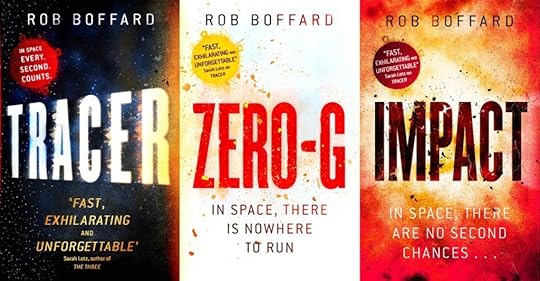
Read the most explosive scifi trilogy ever.
“Constant violence and escalating stakes keep the story moving forward at a bone-jarring pace.” – Kirkus Reviews
“Exhilarating and guaranteed to keep you hooked until the very last page.” – Glamour Magazine
TRACER / ZERO-G / IMPACT
September 19, 2017
Short Story Review: The Bright Sessions

Welcome to my new weekly blog post, where I’ll be reviewing short stories. There are thousands and thousands of them available – in magazines, podcasts, online anthologies, with hundreds more dropping every month. Every week, I’ll listen to and/or read one or two so you don’t have to. It won’t just be scifi either; I’m completely genre agnostic, and will go for any story that piques my interest.
This week: superheroes who need therapy…
Sometimes, all you need to tell a story is a really, really good idea.
If it’s compelling enough, it can drive the story on its own. It can spawn an entire universe, thrumming away at the middle of it like an engine, propelling the reader or listener through the story. With a good enough idea, you can do anything.
The most obvious example I can think of is The Martian. Andy Weir’s book has an almost absurdly simple idea at the centre of it: what would happen if an astronaut was abandoned on Mars? Really, that’s all there is to it. A very simple question, that was answered in an absolutely brilliant book which never wavered from its central focus. Obviously, it helped that Weir was a lightning bolt of a writer, one who happened to know a lot about the science that would help said astronaut survive, and learn to hate the disco music that is his only companion. But with an idea that good, even a writer with half of his skill would be able to concoct a compelling story. Getting a good idea is half the battle.
And with The Bright Sessions, Lauren Shippen has hit on one hell of a good idea.
It’s a little different to the things I normally review. Usually, I’ll take on one or perhaps two short stories, or a single episode of a podcast. But really, the core conceit of The Bright Sessions is so good that I ended up listening to the whole of the first season more or less in one gulp, and right now, I’m halfway through the second. I told myself I would hold off writing about it until I actually finished the existing lineup (there are three seasons available, with the fourth one due in October) but I couldn’t do it. I burned to get this review out. The show is that much fun.
And again, it comes down to that one beautiful, burning idea. In this case, it’s the question: what if you had a therapist who exclusively treated superheroes?
In fairness, perhaps that idea should read: what if you had a therapist who exclusively treated people with extraordinary abilities? The people who sit in Dr Bright’s office aren’t heroes. They are damaged, confused, often heartbreaking cases who are struggling to deal with their powers – ones who have had their normal lives ripped apart, and are struggling to put them back together again. If half the battle is having a good idea, then the second half is all about mining that idea for every bit of gold you can, and Shippen digs very, very deep.
She gives us Sam, a woman who can time travel – but can’t control when and where she goes, with the result that her life is a constant set of often horrifying interruptions. She gives us Caleb, a teenager whose adolescence is made all the more chaotic by the fact that he can pick up the emotions of the people around him, even if they are trying to hide it. She gives us Chloe, a wonderfully loopy personality who can read minds, even when she doesn’t intend to. Each episode is a session, with Dr Bright seeing a patient, and each is a little gem in its own right. The writing here is absolutely top-notch, the dialogue utterly natural. Shippen has a real ear – not just for how people talk, but for what they say when they don’t want to talk.

But the real heart of this particular idea is Dr Bright herself. She’s a calm, controlled presence at the centre of each episode, asking probing questions, seemingly entirely professional. But as the episodes go on, you realise that she has her own agenda – one that has nothing to do with just helping her patients get better. And furthermore, it’s an agenda she herself may not be entirely comfortable with…
The writing is helped along by some fantastic performances. As Dr Bright, Julia Morizawa strikes just the right balance of professional and compassionate, so convincing that it’s a genuine surprise when her true motives begin to unveil themselves. Shippen herself is splendid as Sam, and others, like Briggon Snow as the tortured, difficult Caleb, are a joy to listen to. Snow’s character could have made you want to strangle him. Instead, you desperately want him to be OK.
Sound design is minimal, but effective, thanks to work from Mischa Stanton and Evan Cunningham.
It’s not to say the series is perfect. It’s a slow burn, and while the writing and the story are good enough to keep you hooked, there are some missteps along the way. I won’t spoil it, but a fantastic moment at the end of Episode 6 in Season 1 is utterly squandered, with Shippen leaving us until the start of Season 2 to figure out what it means. And while each episode is fantastic, we are never quite sure what’s happening between them, or who Dr Bright’s other patients are, meaning the experience is a little disjointed. Perhaps that’s intentional, but it can sometimes be frustrating to listen to.
But these are minor black marks. For the most part, this is one of the best pieces of audio fiction out there. Find somewhere quiet, put your headphones on, and just immerse yourself in this. Bright is right.
(Oh, and it’s being developed for TV. Don’t wait. Get on this shit NOW.)

Read the most explosive scifi trilogy ever.
“Constant violence and escalating stakes keep the story moving forward at a bone-jarring pace.” – Kirkus Reviews
“Exhilarating and guaranteed to keep you hooked until the very last page.” – Glamour Magazine
TRACER / ZERO-G / IMPACT
September 11, 2017
Seattle I am coming for YOOOOOOOUUUUU!!!
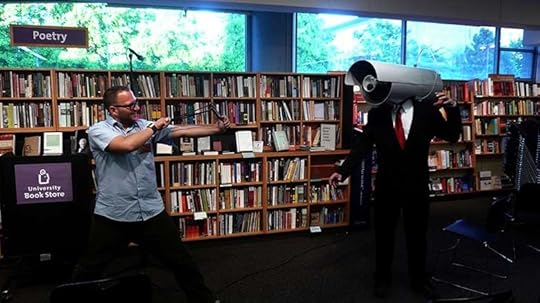
News! Hot, fresh, steaming travel news! Soak it in. Bath in it. Take it home and marry it. Write it love poems and –
OK – too much. But I do have news.
This week, I’ll be in Seattle, and while I’m there, I plan to hit up some fantastic bookstores and sign stock of the Outer Earth series. Any and all books at the following three stores should (in theory) be signed by my fair hand by Friday.
University Of Washington Bookstore
I’ll post photos and social media nonsense after I drop by. Also bar bills, damage receipts, police reports, and anything else that results from my visit.
Also: there’s no short fiction review this week – I’m tight on time, so sadly it’s going to have to wait. But I will be doing one next week, when normal service resumes!

Read the most explosive scifi trilogy ever.
“Constant violence and escalating stakes keep the story moving forward at a bone-jarring pace.” – Kirkus Reviews
“Exhilarating and guaranteed to keep you hooked until the very last page.” – Glamour Magazine
TRACER / ZERO-G / IMPACT
September 6, 2017
Short Story Review: Nice, by A.E. Ash

Welcome to my new weekly blog post, where I’ll be reviewing short stories. There are thousands and thousands of them available – in magazines, podcasts, online anthologies, with hundreds more dropping every month. Every week, I’ll listen to and/or read one or two so you don’t have to. It won’t just be scifi either; I’m completely genre agnostic, and will go for any story that piques my interest.
This week: a middle-aged, mom-jeans-wearing assassin…
One of the annoying things about this year – well, one of the many annoying things – is that it’s become fashionable to shit on Extended Universes. There’s been a recent pileup of articles proclaiming that the interconnected cinematic universe of Marvel/DC/Star Wars/Universal Monsters/Whatever is finished and played out, soon to be as ancient and forgotten as Britney’s bald-head phase.
(Don’t believe me? Here. Here. Also here. Aaaaand here.)
It’s a little difficult to figure out if the writers of these pieces genuinely believe that Extended Universes are a bad thing or if they’re just being overly opinionated for clicks, but it doesn’t make it any less annoying. Fortunately, one of the things you won’t find in this particular corner of the Internet is a tirade against Extended Universes. I adore them. Always have. They were a terrific idea to start, and I feel like they’ve just gotten better over time, as more and more characters have been introduced.
Admittedly, they are hard to do right, and that’s why almost nobody other than Marvel have actually managed to do it. Say whatever you like about Marvel’s movies, but they have a deft touch at placing each story in context within a wider world.
Case in point: SpiderMan Homecoming. The inclusion of Robert Downey Jr.’s Iron Man could have been the worst sort of shoehorning, the kind of thing that was only there because the Extended Universe demanded it. Except, it wasn’t. It made total sense within the story, both thematically and in terms of plot, and the filmmakers were smart enough to never let Downey get in the way, knowing that the few scenes he showed up in would be enough to do everything they were supposed to. It connected the film to the wider Marvel Universe without ever making it feel forced. Result? One of the summer’s biggest blockbusters, and a 92% rating on Rotten Tomatoes. Whether or not you believe in that particular site’s method of aggregating reviews, you’d have to be the world’s biggest misanthrope not to get a kick out of how smart, fun and capable the Spidey flick was. Also, Tom Holland is fucking adorable.
Of course, for every Marvel, there’s a DC, who think it’s perfectly acceptable to create different universes starring the same characters but played by different actors, and who, when they actually have a hit (the fantastic Wonder Woman) turn around and hare off in the opposite direction, right for the cliff, ignoring the startled pleas from the audience. Or Universal, who found a load of old properties knocking around in the basement – Frankenstein, The Mummy, Wolfman – and decided that they should try their hand at this Extended Universe nonsense too, forgetting that you need things like decent plots and characters, as well as stories that are actually fun to watch. Anyway. Point is: even when it’s done in a half-assed way, I still love the concept. I wish we could have more of it. Preferably by Marvel.
Books have a weird relationship with Extended Universes. Usually, they are used to extend a universe already present in another medium, like Timothy Zahn and Chuck Wending (among many, many others) writing books set in the Star Wars universe. Sure, you’ll see the odd author writing a long series of interconnected books all taking place in a single universe, with characters and stories that don’t necessarily interact with each other – J.R.R. Tolkien comes to mind, as does Stephen King – but rarely do you see an iteration of what Marvel are doing.
Imagine if you had one author writing a trilogy set in a particular universe, while other authors write other novels and short stories, set in the same universe, with occasional crossover? What if you had multiple creators working with the same set of building blocks? God knows if it would ever happen – or if a publishing company would ever be up for such an act of authorly hubris – but that’s a universe I’d love to spend time in.
(Further thought: it occurs to me that this might have already happened somewhere, and I just haven’t noticed. If it has, let me know in the comments.)
I did a radio interview a few years ago with Antonia Honeywell, both of us newbie authors, both of us appearing on a radio station in Wandsworth with maybe like one listener. I’d just put out Tracer, and she’d just dropped The Ship, a really cool novel set just after the end of the world (and which was later picked up by Orbit Books, meaning we now share a publisher). She mentioned to me that she almost felt like her story took place in the same world is mine, only about a hundred years apart. It’s a concept that blew my mind then, and it blows my mind now. It’s one of those “Wouldn’t it be cool if…” moments; think of the Easter eggs. Think of the in jokes, the locations could be shared between books. Think of authors phoning each other up, obsessively checking details, working together to create these shared experiences for readers. Someone turn up the heat in here, because I just got goosebumps.

For now, I’ll have to settle for authors writing novellas and short stories set in the world they create in their novels. I’ve done this a little bit myself, and it was great fun. And so, when I was cruising for a story to read this week, I was excited to come across Nice by A.E. Ash, published online by The Book Smugglers, a superb book blog that recently turned to publishing. Nice is set in the same world as Temporary Duty Assignment, a novella by the same author that the publishers released a couple of weeks ago. It’s framed as a prequel, and it shows a confidence in the world and the characters that I really like. Although the main character, Yukiko, isn’t the star of Temporary Duty Assignment, this story mentions that star, and fills in some details of her backstory. It’s a nice trick.
Maybe I’m just biased, having done it myself. Who knows? But whatever you think of my opinion, there’s no denying that Nice is a fun little story: an amuse-bouche to nibble on, and see if you want to order the main course. And for the record: I would absolutely be down for an Extended Universe here.
Although Yukiko is the focus, it’s the world that will draw you in. Ash paints a convincing picture of a post-climate disaster world that is somehow still managing to hang on, and her real trick is making it somewhere that you might actually want to visit, if not necessarily live for an extended period of time. The details that fill in the world, and the kind of life that Yukiko leads, are carefully placed, never getting in the way, doing their job without obscuring the story. A bit like Iron Man in the SpiderMan movie, come to think of it.
While the world feels realistic, there’s no doubt that the story being told in this particular short is cappuccino-frothy. Yukiko is an assassin, with a list of jobs behind her and an annoyingly-helpful, syrupy AI companion. Much of the story is concerned with her day-to-day life, and while it’s certainly interesting, there’s a sense that this bit could have been a little bit streamlined. Still, when the action starts – our middle-aged, mom-jeans-wearing assassin taking on a job that sets off her internal alarm as being a little too perfect – it flows at a good clip. And it leaves you wanting more: the crucial element of any kind of extended universe, be it a Marvel movie, or a simple prequel short story. Plus, it helps that Ash is a fluent and graceful writer, with a clean, economical style that is a joy to read.
There is, however, at least one pretty egregious error. Halfway through, the first-person story changes to third person, and then abruptly back again: a pretty obvious whoopsie that should have been eliminated in the editing process. It was frustrating to see an otherwise enjoyable story being marred by such a glitch.
Still, there’s definitely life here. The story that Ash builds might be a quick fix, but she’s embedded it in a universe that I’m really looking forward to spending time in. If we’re going to rank this by comparing Extended Universe novels to Marvel movies – because why not do a complicated, Bill-Simmons-style pop culture metaphor to end this off? – where Chuck Wendig’s Empire’s End is SpiderMan Homecoming and Michael A. Stackpole’s Iron Jedi is Iron Fist, then Nice is Ant-Man. Fun, light-hearted, skipping across the brain and leaving only the barest trace. Then again, Ant-Man himself got one of the best moments in the recent Captain America movie with that whole “I do it all the time. I mean, once… In a lab. And I passed out.” moment, so who knows where this is going to go?
Nice, by A.E. Ash. Published on The Book Smugglers, August 2015 (Text, free to read online)

Read the most explosive scifi trilogy ever.
“Constant violence and escalating stakes keep the story moving forward at a bone-jarring pace.” – Kirkus Reviews
“Exhilarating and guaranteed to keep you hooked until the very last page.” – Glamour Magazine
TRACER / ZERO-G / IMPACT
August 31, 2017
How Naughty Dog screwed up Uncharted: The Lost Legacy
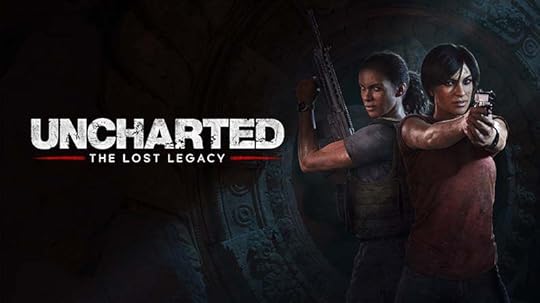
It’s amazing how even good companies can screw up the most basic things.
You might not know the name Naughty Dog, but you’ve definitely heard of what they do. They make videogames. Games like The Last Of Us, Crash Bandicoot, and the incredible Uncharted series. They are known for their attention to detail, their incredible cinematography, their action-packed gameplay, and their brilliant graphics and voice acting.
This week, they released a new game in the Uncharted series – one I was excited to play. Instead of starring series regular Nathan Drake, this one put two supporting characters in leading roles: Drake’s treasure-hunter-colleague-cum-lover Chloe Frazier and the antagonist from the last game, Nadine Ross. Chloe and Nadine team up to hunt down a mythical treasure in India, and I couldn’t wait to try it out.
(Yeah, Nadine was a bad guy, but now she’s a good guy, or at least a guy who exists who in a grey area. Also, not actually a guy. Anyway…)
Nix and I have spent a few hours with the game. It’s a lot of fun. Not only does it deliver everything Naughty Dog are famous for, but there’s also real chemistry between the two leads. I genuinely give a shit about them, and love their back and forth as we hare around the Indian marshlands in a badass Jeep.
But there’s this one thing…
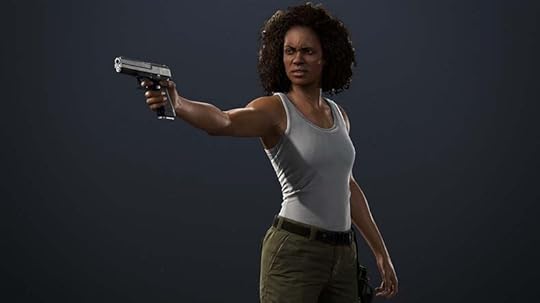
OK. I hate callout culture – that obnoxious, manufactured social media outrage over something deemed even mildly offensive – but I don’t think pointing this out counts. For one thing, it’s an actual, demonstrable thing in the game, and for another, it almost ruined the experience for me. I’m not kidding when I say it nearly wrecked the game. More importantly, it was something that could have been avoided with about ten seconds extra effort.
Chloe is an Australian. Her voice actor, , hails from Sydney, and she’s knocked her character out of the park in every game she’s appeared in. Nadine Ross is a South African, like me. Her voice actor is , and she hails from…um, Biloxi, Mississippi.
And her South African accent is horrible.
I mean that in its most literal sense. It horrifies me. It is a total mess, the worst South African accent I have heard in any film or videogame, ever. Worse than Leo in Blood Diamond. Worse than Joss Ackland in Lethal Weapon 2. Worse than even JB Blanc in the Titanfall 2 game, and he sounded like he was carrying around two giant marbles in his mouth.
Bailey’s accent veers all over the place. One second, it’s Swedish. The next, Aussie. Then it does an about face and veers up to Russia before bouncing down into the Asian subcontinent. It’s not that she’s phoning it in – it that she sounds like she’s trying way too hard. South African accents are notoriously difficult to nail down, but Bailey’s is a disaster.
You know what it reminds me of, actually? A guy trying to pull off a golf swing, only he goes in way too hard, misses the ball, swings all the way round, full 360, then lets go of the club, which sails off into the distance and brains a caddy walking across the fairway. I might not know how to do a lot of things, but if there’s one thing I am definably an expert in, it’s good South African accents. You know, on account of being born there, and living there for twenty years.
You could argue that the character travels a lot internationally, has probably been out of South Africa for some time, and so doesn’t have a strong accent. Except no South African I’ve ever heard, in any setting, talks like that. I should know. I’ve spent a decade bouncing between countries that are not South Africa.
It’s not that Bailey can’t do voiceover. Her list of credits is enormous, going all the way back to 1991. And despite her shit-show of an accent, she can definitely act. So how did she cock this up so badly?
In the previous game her character appeared in, it was rough, but it wasn’t too much of a problem; Nadine Ross wasn’t in every scene, and although it was annoying, it was tolerable. Here? Nadine is always onscreen, always speaking, and I’m trying to appreciate the great writing and witty banter but I just can’t get over how she sounds like Gimli from Lord of the Rings bumbling his way through an elocution lesson. I’m not joking when I say it almost breaks the game for me. It’s that bad.
And you know what would have fixed this? Wait, hang on, this is really complicated. Work with me here…
You have to –
(Take a deep breath)
Hire a South African actress.
Jesus, Naughty Dog. It’s not hard. It really isn’t. You’ve hired nationally-appropriate people before. Claudia Black, for one. Pema Dhondup and Rene Auberjonois in Uncharted 2 for another. What would it have taken to find a South African voiceover to handle Nadine Ross? Sure, you’d have to fly her over to the US for a few mocap sessions, but who gives a shit? You’re Naughty Dog! You make more money than god.
Hell, I’ll do it for you. A five second Google search gives me this. And this. Also this. I’m not saying that casting the perfect Nadine Ross is that simple, but maybe you shouldn’t turn around and give the job to an actor from Mississippi.
(There’s also this whole debate about Nadine, a black character, being played by a white actress, which is something I don’t want to touch with a twenty-foot pole.)
Blugh. It’s such a basic element, and they cocked it up so, so badly. For most people, it’s probably not even noticeable. For me, it’s like someone is reaming out my ears with a set of pipe cleaners.

Read the most explosive scifi trilogy ever.
“Constant violence and escalating stakes keep the story moving forward at a bone-jarring pace.” – Kirkus Reviews
“Exhilarating and guaranteed to keep you hooked until the very last page.” – Glamour Magazine
TRACER / ZERO-G / IMPACT
August 30, 2017
NEW BOOKS INCOMING!
Time for some big news.
Not only do I have news on the book coming next summer – which is an idea I’m so excited about that my head is going to pop right off my shoulders and go bouncing around the room like a loony pinball – but I also have a cover reveal for another book that is coming next year.
Yep – I’m dropping two things in one year. Why? Because fuck yeah, that’s why.
One of those things is a collection of previously-published books, squashed into one amazing single volume. The other is an entirely new book, set in an entirely new universe.
New Thing #1: Cover Launch!

What the hell is that?
The Outer Earth Boxset. Or at least, that’s what I call it. Its actual name is just Outer Earth, and it collects all three of the novels I’ve published so far – Tracer, Zero-G, and Impact – in one massive omnibus.
Orbit Books released that cover above today. It looks, frankly, bloody amazing. If you haven’t experienced my trilogy yet, it’s the perfect entry point.
Can I get an official blurb?
You sure can! Straight from the typewriter-smashing gremlins at Orbit Books headquarters…
Welcome to Outer Earth: a vivid, dangerous world where every day is a desperate struggle for survival. Who said in space no one can hear you scream?
Outer Earth is a huge space station orbiting the ruins of our planet. Dirty, overcrowded and inescapable, it’s humanity’s last refuge . . . and possibly its final resting place.
For there are dark forces at work on the station: forces that seek to unleash chaos. If they succeed, there will be nowhere left to run.
This omnibus edition contains all three of Rob Boffard’s adrenaline-fuelled Outer Earth novels: Tracer, Zero-G, and Impact.
Is there any new bonus material?
Unfortunately not – it’s a printing thing. The boxset/omnibus/giant word explosion is already 1072 words long, and adding more into it would just complicate things. This is a book that could kill you if it fell on you from a high shelf.
Side note: please don’t let that put you off buying it.
That isn’t to say I won’t be releasing some new shit online when it drops. Newsletter subscribers will get that first, by the way.
Does it include Echoes?
No, for the same reason as above. Fear not! Echoes (the short story collection set in the same universe) is still very much available, at a knockdown price.
Are you planning to retcon that awful, horrible, no-good, gut-wrenching, tear-jerking, amazing twist at the end of Impact, you bastard?
Again, no. Sorry. Your gut is on its own.
When is it out?
18 Feb 2018, worldwide, on bookshop shelves and on your ereader.
Can I preorder?
You sure can!
Amazon / B&N / Waterstones / Indigo Chapters
How can I spread the word?
Post about it on Twitter. (Facebook auto-share isn’t playing nice with my site, but I’m working to fix it. You can directly share the link on this page though!)
And as always, remember to leave reviews on Amazon and Goodreads. Muchas gracias!
New Thing #2: NEW BOOK DETAILS!
Wait, what?
That’s right, sports fans. An entirely new book from your boy, out in summer 2018. Never before seen. Entirely new universe. Unconnected to anything that came before.
What’s it called?
Adrift.
Sweet. And what’s it about?
I’ll let Orbit Books tell you that:
Set in the far reaches of space, ADRIFT is about a group of tourists who board a small vessel for a trip around Sigma Station – a remote space mining facility and luxury hotel. But when a mysterious ship attacks the station with devastating consequences, the tourists end up stranded in the depths of space, out of contact with civilisation and with no way home . . .
So you know how Riley, in the Outer Earth books, could kick some serious ass? How she was always capable and (kind of) in control? It’s the total opposite here. Nobody on this little tourist ship – from the bickering family to the elderly tourist with the fannypack to the honeymooning couple to the just-graduated tour guide – knows what the hell they’re doing. They are way, way, way out of their depth, and they’re going to have to work together if they’re going to have any chance of survival.
I had so much fun writing this. It was an idea that exploded into being fully-formed, and I couldn’t wait to give it a shot. You’re going to love it.
Is it done?
95%. Orbit’s Anna Jackson and I need to cogitate over some minor edits, and then we’re good.
When and where is it out? And is there a cover yet?!?
No cover yet – although I’ve had some chats with the publishing folk, and they’ve got some terrific ideas…
It’ll be out worldwide, in stores and digital, in June 2018.
Can I preorder?
Little too early for that – but you can bet I’ll be sharing that link around when I have it. As always, newsletter subscribers get it first – along with deleted scenes, exclusive artwork, cover concepts…the works.
August 29, 2017
Short Story Review: Evitative, by B.C. Edwards (Pseudopod)

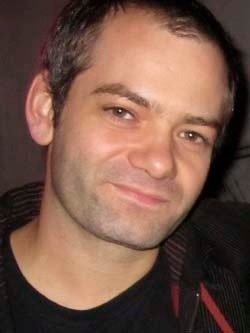
Welcome to my new weekly blog post, where I’ll be reviewing short stories. There are thousands and thousands of them available – in magazines, podcasts, online anthologies, with hundreds more dropping every month. Every week, I’ll listen to and/or read one or two so you don’t have to. It won’t just be scifi either; I’m completely genre agnostic, and will go for any story that piques my interest.
This week: a haunting post-apocalyptic tale of insanity…
Can grammar scare you?
Serious question. I’m not talking about dimly-remembered tests from junior school, where your psycho teacher would name and shame the kids who didn’t get the difference between full stops and commas (wait, that didn’t happen to you? Me neither…) I’m talking about whether grammar could ever be used to inspire actual fear. It seems like a weird concept, but it actually exists in some of Australian aboriginal languages – although it’s crazy rare. It’s known as the evitative, and usually takes the form of a suffix that indicates a noun is to be avoided or feared.
Yeah, I know. Kind of reaching, isn’t it?
Basing a horror story off an ultra-rare grammar rule is the kind of pretentious arse-twaddling I normally try to avoid. Unless, of course, it appears on Pseudopod, one of the better horror story podcasts. If they give a stamp of approval, then it must be worth listening to. All the same, calling a horror story Evitative risks inviting confusion, rather than feelings of actually wanting to listen to it. Calling it Evitative means that listeners might, in fact, avoid it or fear it (Sorry. Couldn’t resist.)
So because I’m a sucker for punishment – and because the mission of this particular weekly blog is to actually dig into the thousands of short stories out there and try to make sense of them, no matter what they might be, or what obscure grammar rules they might invoke – I decided to give this story a go.
It’s part of a collection from writer B.C Edwards entitled The Aversive Clause, and it is…not what I expected. For starters, if there was any overt connection to actual grammatical rules in the story as a cause for horror, I didn’t get it. I don’t mean this as a bad thing. If there was a connection, it was a very subtle one, and it didn’t get in the way of a story that haunted me long after I stopped listening.
It’s after the end of the world, the waters of risen, and the hero – a pregnant woman – is living in a treetop hideaway with her caretaker, the mute JoJo, doing everything they can to protect themselves from men who want to kill and eat them. It reminded me of Margaret Atwood’s Oryx and Crake – not just in terms of post-apocalyptic content, but in terms of tone and language, as well. While the setup is simple, and the allusion to grammatical rules a lot less intimidating than you might think, the story being told is incredibly complex and multilayered. I almost don’t want to reveal too much. To do so would spoil the story that is more experienced than listened to: a tale that unravels like a ball of string, becoming more tangled and knotty and complicated, sucking you in with some truly brilliant writing.
I hadn’t come across B.C. Edwards before, but he’s one helluva storyteller. His writing is elegant, clear, and engaging, with each word precisely placed, and each sentence polished to a mirror shine. Although I get the sense that he’s a prose writer first and foremost, his words certainly lend themselves to audio form, and in doing this, he is helped along by some fantastic narration from Dani Daly. Her measured, calm voice is the perfect match for this particular story, and the soundbeds that run underneath her – chirping crickets, gently swishing water – really help put you in the middle of the story. Pseudopod have always had a deft hand with sound work, and they nail it here.
The real reason you should listen to the story is that it will stick with you. My first reaction to it was that it was too cold, a little too analytical to be truly great. But it haunted me, coming back to me at odd moments, an image or a line sneaking into my mind without me noticing. It was things like the opening, which is utterly captivating, or lines like “Between us and the mountains, there’s nothing but water: grey, and thick, reflecting the sun like grease might.” It’s heady stuff.
Even after listening to it, I’m still not entirely sure of the link between the story and the titular grammar rule, and while I get that it’s a conceit, it feels like the concept is a little too intellectual and academic to really draw in listeners. Which is a shame, because this is a truly magnificent story, and it deserves a better title.
Go listen to it, and thank me later.
Evitative, by B.C. Edwards. Published on Pseudopod, 18 August 2017 (Audio, 50 Minutes)

Read the most explosive scifi trilogy ever.
“Constant violence and escalating stakes keep the story moving forward at a bone-jarring pace.” – Kirkus Reviews
“Exhilarating and guaranteed to keep you hooked until the very last page.” – Glamour Magazine
TRACER / ZERO-G / IMPACT



